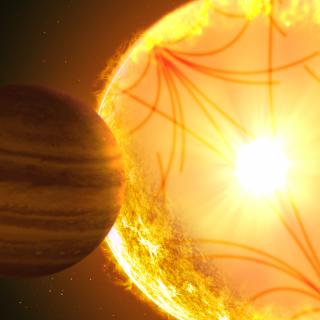Bibcode
Benomar, O.; Baudin, F.; Campante, T. L.; Chaplin, W. J.; García, R. A.; Gaulme, P.; Toutain, T.; Verner, G. A.; Appourchaux, T.; Ballot, J.; Barban, C.; Elsworth, Y.; Mathur, S.; Mosser, B.; Régulo, C.; Roxburgh, I. W.; Auvergne, M.; Baglin, A.; Catala, C.; Michel, E.; Samadi, R.
Referencia bibliográfica
Astronomy and Astrophysics, Volume 507, Issue 1, 2009, pp.L13-L16
Fecha de publicación:
11
2009
Revista
Número de citas
104
Número de citas referidas
78
Descripción
Context: Solar-like oscillations have now been observed in several
stars, thanks to ground-based spectroscopic observations and space-borne
photometry. CoRoT, which has been in orbit since December 2006, has
observed the star HD49933 twice. The oscillation spectrum of this star
has proven difficult to interpret. Aims: Thanks to a new
timeseries provided by CoRoT, we aim to provide a robust description of
the oscillations in HD49933, i.e., to identify the degrees of the
observed modes, and to measure mode frequencies, widths, amplitudes and
the average rotational splitting. Methods: Several methods were
used to model the Fourier spectrum: Maximum Likelihood Estimators and
Bayesian analysis using Markov Chain Monte-Carlo techniques. Results: The different methods yield consistent result, and allow us
to make a robust identification of the modes and to extract precise mode
parameters. Only the rotational splitting remains difficult to estimate
precisely, but is clearly relatively large (several μHz in size).
The CoRoT space mission, launched on 2006 December 27, was developed and
is operated by the CNES, with participation of the Science Programs of
ESA, ESA's RSSD, Austria, Belgium, Brazil, Germany and Spain.
Figures 5-9 and Table 2 are only available in electronic form at
http://www.aanda.org
Proyectos relacionados

Sismología Solar y Estelar y Búsqueda de Exoplanetas
Los objetivos genéricos de este Proyecto son: 1) el estudio de la estructura y dinámica del interior solar, 2) la extensión de dicho estudio al caso de otras estrellas, 3) la búsqueda y caracterización de planetas extrasolares por métodos fotométricos (principalmente mediante el método de tránsitos) y espectroscópico (variaciones en la velocidad
Savita
Mathur